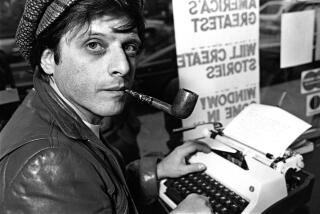Looking Into Looking Back : FABRICATING LIVES: Explorations in American Autobiography <i> by Herbert Leibowitz (Alfred A. Knopf: $24.95; 371 pp.; 0-394-57428-1) </i>
The preface to this exuberant study of eight American autobiographies is itself autobiographical: It was Whitman’s “Song of Myself” that gave the adolescent Herbert Leibowitz his “first inkling of autobiography’s renegade power--and its multiple forms of self-disclosure and self-concealment.”
Thirty-five years later, Prof. Leibowitz of the CUNY Graduate Center has produced a series of illuminating essays on a genre that has “seemed the foster child of literature: Nobody could certify its parents. Was it the scion of history or of fiction--or, more probably, a hybrid, like an exotic orchid or a mule?” He approaches his eight subjects with such gusto that a reader may sometimes feel trapped in a kind of critical bear hug, but this is all right, because “Fabricating Lives” remains full of good intentions and sound judgments.
The autobiographers he chooses--the polymathic Benjamin Franklin; the architect Louis Sullivan; the social worker Jane Addams; the agitating Emma Goldman; and the writers Gertrude Stein, William Carlos Williams, Richard Wright and Edward Dahlberg--don’t quite represent the “cross-section of American experience” Leibowitz claims they do: “Fabricating Lives” is a bit heavy on literary lives as they were lived in the early 20th Century. But there is still God’s plenty here in terms of varied temperament and technique. Having studied a good many more than the eight to which he pays extended attention, Leibowitz says American autobiographies are generally marked by the author’s “quest for distinction,” be it spiritual, social, or, in the Whitmanic sense, just selfish, i.e., the realization of one’s unique personality. These quests often involve, at least in written recollection, a certain aw-shucks quality: “Several of the autobiographers . . . pass themselves off in their prose with a crooked or sheepish grin as homemade innocents.”
Leibowitz wisely avoids making too many of the leaky generalizations about “American culture” so beloved by the interdisciplinary practitioners of that ever-expanding academic field, and while “Fabricating Lives” makes a good many useful connections among the eight, any reader not terribly interested in the whole team being fielded can feel free to pick and choose whichever individuals he wishes to pursue, since each of the author’s chapters is a substantial set piece.
By reacting to Benjamin Franklin’s “charmed life” as “fortune’s pet” with indulgent amusement instead of moralistic spite, Leibowitz rescues him from the famous Dionysian scorn of D. H. Lawrence. If Franklin practiced “scarcely any inwardness,” and if a “slight unpleasant smell of the schemer” lingers about the countenance that sits, so pleased with itself, on the $100 bill, Leibowitz still has to admire him as a non-neurotic man of exceptionally varied achievement. He makes a good point, albeit in a slightly fussy sentence: “In (Franklin’s) hindsight, there is no rivalry between principle and inclination that can’t be resolved in favor of a judicious self-regard.”
Louis Sullivan’s emotional reckonings were more bitter than self-satisfied. He could never comfortably reconcile his enthusiasm for democracy with his contempt for the shallow taste of democracy’s citizens, and this architect who minted the maxim “form follows function” wrote his Autobiography of an Idea in a curious third-person prose that “unlike his architecture, is overblown like a rococo building . . . .”
Two of Leibowitz’s best chapters are the ones contrasting the reformer Jane Addams (Twenty Years at Hull-House) and the Revolutionary Emma Goldman (Living My Life). In 1889, after “years of painful stumbling and procrastination,” Addams abandoned cultural dilettantism for her settlement house in Chicago. She combined her “disinterested moral intelligence” and her alertness to reality to make Hull-House not only a place where the poor could seek relief, but an instrument of practical politics on their behalf: “(She) decided after a fractious decade of debate and rigid ideological poses that reformers should work with the businessmen.” Her practical idealism shows up in a plan style that Leibowitz says “derives from the simple homilies and parables of the Gospels and, like the early Christians, refuses to engage in tirades.”
By contrast, Emma Goldman’s autobiography is a “garrulous, exhausting” tone that remains “barren of self-knowledge” when trying to make sense of her experience. A better platform rabble-rouser than author, Godlan proceeded by instinct from illusion to illusion, becoming disappointed first by America and then by Soviet Russia. Jane Addams found Leon Czolgosz, the assassin of President McKinley, to be just a horribly baffled “outcast,” and extreme example of the “half-crazed, discouraged men” unable to melt into the American pot. But Goldman thought the “poor creature” might be among “the sanest in a crazy world.”
Although he forgives Franklin his lack of introspection, Leibowitz does incline to the view that in assessing our experience “the inside has more moral prestige than the outside.” He likes a vivid depiction of surrounding circumstance, but he likes “depth” for his autobiographers too. The poet William Carlos Williams, one of Leibowitz’s pretenders to innocence, is “skittish” and evasive; his on-the-surface narrative does “not add up to the whole man, just a blurred facsimile.” Gertrude Stein is more artful, but she too practices an “unswerving commitment to the external.” Unlike Goldman, she had considerable self-knowledge, but seemed uncomfortable, except in rare instances, displaying it. She even chose to write her own life as “The Autobiography of Alice B. Toklas,” pretending to her companion’s voice and becoming, at one remove, “her own Boswell.” In her other works Stein created some odd concoctions in what Leibowitz calls her “linguistic kitchen”--fiascoes or delicacies depending on one’s tastes. “The Autobiography,” by ironic contrast, uses a “stripped, neutral style” as its staple ingredient.
Leibowitz’s chapter on Richard Wright’s “Black Boy” and “American Hunger” is perhaps his least successful, marred as it is by rhetorical piety (“Like a suppliant who appeals for mercy and help are met by his captors’ stony mien”) and apparent confusion. He makes some good points about Wright’s use of style as both a weapon and a vehicle to put him “above the fray,” but he remains unconvincing as to the nature of Wright’s effectiveness with “disinherited black masses.” He contrasts Wright’s books to Malcolm X’s autobiography, concluding that “Malcolm could reach them as Wright never could, because his years as a flamboyant hustler and criminal gave him the insider’s expertise about the ghetto mind.” Where would Leibowitz put Martin Luther King?
The sexually tormented autobiography of Edward Dahlberg isn’t as familiar as the other books Leibowitz takes up, but “Because I Was Flesh” is the subject of “Fabricating Lives’ ” last chapter. Dahlberg’s book is “a masterpiece of Oedipal obsession, a poetic memoir of primal sunderings and rages” by a man who married seven times; that even Dahlberg can affect innocence--and Leibowitz says he can--is the most convincing argument for the hold of that technique on American autobiographers.
Oscar Wilde said that there “is no such thing as a moral or an immoral book. Books are well written, or badly written. That is all.” But that isn’t quite all there is to be said about a genre that invites us to judge not only the author’s prose style but his character, too. Leibowitz is sensibly even-handed about this, choosing not to place style above character, but to use the former as the key to the latter: “The self reveals itself through style. . . . A reader stumbles upon the self hiding in a secret fold or syntax. . . .” There is a good case to be made for this, though Leibowitz overdoes it; in fact, the close readings he performs on the generous excerpts he gives from his autobiographical octet are the weakest portions of “Fabricating Lives.” Too often he follows a long vivid quotation with a long piece of anticlimactic exegesis. For example, after a colorful passage from “The Autobiography of Benjamin Franklin,” in which the author throws someone out of a boat to teach him a lesson, Leibowitz writes: “the strong verbs ‘struck,’ ‘clapt,’ ‘pitch’d,’ and ‘lifted,’ along with the terse dialogue and vigorous rhythm, imbue Franklin’s sour retribution with a vivid power.” Opposite such obviousness, there is the occasional overreach, as in this explanation of a sentence from Emerson: “The kinetic, autonomous clauses are held together by egalitarian semi-colons and periods, but the paragraph and essay just barely provide a cohesive community for Emerson’s thoughts, as if heralding the partition that the Civil War would bring to the nation.”
But these are relatively small flaws in a lush and lively book. Leibowitz, bless him, continues to believe “that in an age of deconstruction there (is) still room for a book of belletristic criticism.” In fact, he has an old-fashioned, gluttonous appetite for words and cadence. He makes sentences the way Dagwood makes sandwiches. After one as overstuffed as this--”Though ‘Black Boy’ is not rich in spontaneous play, Wright ventures outside the invisible walls that enclose his character and reconnoiters the world in quest of an amnesty for his fears”--you think he’d be ready for a breather, but listen to the very next phrase he serves up: “Childhood is a nourishing placenta to his art. . . . “ It is not that Leibowitz can’t be pithy. Again and again in “Fabricating Lives” he’s just that: “Confession, in autobiography,” he tells us, “is a form of sincere equivocation,” perhaps because “All sexual transports are a form of involuntary servitude.” And when he tells us of Jane Addams’ “hospitality to experience,” he’s done several good pages’ work in three words. It’s just that he sometimes can’t stop himself. What he says of Louis Sullivan often applies to Leibowitz: “From Whitman he learned the habit of setting sentences in motion and marching them in parallel pairs until they empty into the Ocean of Words.”
But too much of a good thing is preferable to too much of nothing, which is what most theory-worshiping and language-loathing academic critics would offer up on Leibowitz’s subject. If one occasionally wants to ask of the author what one director is supposed to have requested of Ethel Merman--”Less, Ethel, give me less”--one could hardly cast a better person in the critical role Leibowitz is performing. If style does hold the key to personality, the author of “Fabricating Lives” seems to be a highly intelligent man occasionally carried away by the subject to which he’s given his warm heart.
More to Read
Sign up for our Book Club newsletter
Get the latest news, events and more from the Los Angeles Times Book Club, and help us get L.A. reading and talking.
You may occasionally receive promotional content from the Los Angeles Times.






